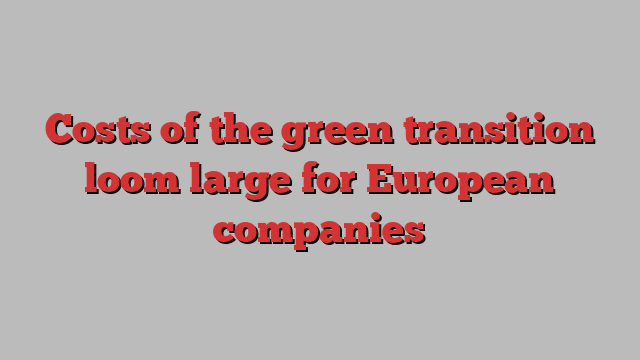
Unlock the Editor’s Digest for free
Roula Khalaf, Editor of the FT, selects her favourite stories in this weekly newsletter.
A Norwegian car dealership weighing selling petrol or diesel cars next year, a Swedish industrial start-up urgently needing fresh capital despite having raised an eyewatering $15bn already, the poor uptake for heat pumps across Europe this year.
They may be three seemingly disparate news items, but together they offer signs of the struggles that some Europe business leaders report over the green transition of industry. They worry that Europe’s policymakers are ill prepared for just how expensive the shift is likely to be for the continent, pointing to hundreds of billions of euros in investments and subsidies that are needed. Otherwise, the business leaders warn, competitors such as China and the US are ready to pounce.
“I don’t think European governments have woken up at all to the realisation of just how expensive this will all be. But in terms of jobs, in terms of business, it is so important Europe does not get left behind,” one European industrialist told me.
Take the car industry. There is a big pushback from the continent’s carmakers over the proposed 2035 phaseout of fossil cars. But Norway has shown the way, looking on course to sell only electric cars by next year thanks to generous incentives. The beneficiaries are far from the traditional carmakers, however. Tesla regularly tops the Norwegian new sales statistics while Oslo’s main shopping street has just one car dealership: for Chinese brand Nio. Still, Norway’s budget presentation on Monday showed how vulnerable even this transition is. A small easing in taxes for fossil fuel vehicles led Norway’s biggest auto dealership to say it was considering reintroducing the sale of petrol and diesel cars next year.
Any sense of a reprieve for European industry could be shortlived though even as Brussels pushes ahead with tariffs on subsidised Chinese electric vehicles. Simulations by the European Central Bank, cited by its former president Mario Draghi in his report on competitiveness, showed that if Chinese carmakers received similar subsidies to the country’s solar industry then EU domestic production of electric vehicles would fall by 70 per cent and European manufacturers’ global market share would drop by almost 30 percentage points.
Vincent Clerc, chief executive of shipping giant AP Møller-Maersk, says Europe is facing a “stark choice”. It can impose tariffs “to make more expensive products that would accelerate the transition towards green to protect the old way of doing things”, or it could seek to create new industrial champions based on innovation.
The journey of one project — Northvolt’s Swedish battery factory — underlines the difficulties. It is perhaps the continent’s flagship green project, designed to fight back against Asian dominance of this crucial industry. But despite raising more than $15bn in equity, debt and subsidies, the Swedish start-up, is fighting for its life. It desperately needs fresh capital and has been only producing a small part of its capacity.
The US has responded with massive subsidies through the Inflation Reduction Act. Northvolt estimated the IRA would give it more than €8bn in support over the lifetime of one battery factory while Volkswagen told EU officials it would be more like €9bn-€10bn. Some European governments such as Germany have offered incentives to Northvolt and others, but nowhere near the same scale. Meanwhile, Sweden has ruled out a state rescue of the battery maker. “What is Europe without cars, without batteries?” asks a Swedish business person, pointing to the 14mn people employed by the auto industry in the EU.
It is a similar situation in many other industries as questions abound about the pace and cost of the green transition. Sales of heat pumps — designed to be more efficient and less polluting than gas boilers — almost halved in Europe in the first six months of this year as subsidies have declined. Germany has watered down a ban on new gas and oil boilers after it triggered a public and political backlash. Europe is even struggling in areas where it once dominated with Draghi pointing out that the EU represented two-thirds of early-stage venture capital for hydrogen in 2015-19, but only 10 per cent in 2020-22.
All this is causing European industrialists increasingly to sound the alarm, urging policymarkers to put up serious money to develop the right kind of green industry. Clerc says: “The green transition is a process that none of us have tried and that none of us can achieve alone. It has a high level of complexity, it’s long and drawn-out.”
X: @rmilneNordic